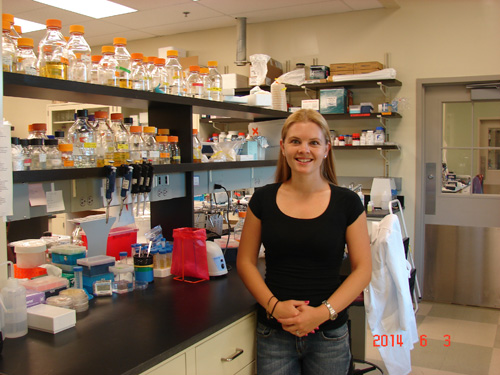Carla Spence is graduating with a Ph.D in Molecular Biology and Genetics from the University of Delaware in Summer 2014. She entered graduate school after receiving her B.S. in biology from the same University. She loves spending her leisure time with her husband, Sean, 2 years old son Trent, and her 8 months old daughter Callia.
Recently we spoke with Miss Spence to know more about her research, especially regarding the study published in BMC Plant Biology (doi:10.1186/1471-2229-14-130) and also about why it is important, how life as a research scientist is, and so on. So let’s go ahead:
Q. Let us start with your research topic. What is your research area? Will you please tell us a bit more on this? What did you find?
Carla Spence: The focus of this project is using natural soil microbes to increase the resistance of rice to blast disease. Rice blast is caused by the fungal pathogen Magnaporthe oryzae. We isolated bacteria from the rice rhizosphere, which is the soil surrounding the roots, and found one bacterium, EA105, which can drastically inhibit the growth of M. oryzae. What’s more interesting is that rice roots can be treated with EA105 and this triggers a defense response in the plant called Induced Systemic Resistance (ISR) which makes the rice plants more resistant to M. oryzae infection. EA105 can protect rice from M. oryzae without physically coming into contact with the fungus.

Carla Spence: ‘Each year, between 10 and 30% of rice is lost to blast disease, and conservatively this would be enough rice to feed 60 million people.’
Q. Why is this important? (i.e. why should the general public care about this?)
Carla Spence: Rice is a staple food crop worldwide, and provides on average 20% of the calories that humans consume. Each year, between 10 and 30% of crops are lost to blast disease, and conservatively this would be enough rice to feed 60 million people. Reducing the crop loss due to blast disease has the potential to positively impact food supply.
Q. Is this truly new information or does it confirm what other researchers have found?
Carla Spence: The idea that microbes can be used to promote plant growth and protect against disease has been around for a few decades. It’s a natural and sustainable method as compared to using chemicals which pose environmental and health hazards. However, the mechanisms by which the microbes produce these effects in plants is not fully understood, and we have shed some light on how EA105 is protecting rice. Additionally, we are using an isolate that came from rice soil, rather than a lab strain or non-native soil isolate, which increases the chances that this bacterium will survive and thrive in rice soil.
Q. How did you land here? Was it your goal?
Carla Spence: I entered into a Ph.D program in Molecular Biology and Genetics at the University of Delaware. In our University, biology and plant sciences are two separate programs, in different colleges. However, I was introduced to Dr. Harsh Bais, who is in the plant and soil science department, and given the opportunity to do a 6 week rotation in his lab. It was clear that he was an enthusiastic and supportive advisor, and I truly enjoyed working on this project, so I’m thankful I was able to stay in his lab to complete my dissertation even though he was from a different department. I never imagined myself working with plants, but I love it and I’m so glad that I was given the opportunity. It has certainly broadened my skill set.
Q. How many hours a day you spend for study. How you arrange other side of your life like social activities so to say?
Carla Spence: The workload varies depending on what needs to get done. Typically, I am able to get most of my work done during normal working hours, though occasionally I need to stay late or come in during the weekend to start or finish an experiment. It largely depends on the advisor and the nature of the research, but in general graduate students have quite a bit of flexibility in their schedules. Having supportive family and friends is helpful. I was able to have two children while working on my dissertation and it did not set me back at all, but I had a lot of support from my family and my advisor.
Q. Are you satisfied with your results? What about your publications?
Carla Spence: Yes! This was a very broad project and it could have gone in so many directions. We were lucky to find isolate EA105 and it was been exciting trying to figure out how it is working. I am very pleased with how the project has turned out, and that it has been so productive in terms of publications as well. The three-way communication between EA105, rice, and M. oryzae is complex but it opens up so many avenues which we can explore.
Q. If you would not be at your current profession, what other options would you consider for your career?
Carla Spence: Now that graduate school is coming to a close I am exploring my career options. Most likely I will find a position with a biotechnology company, though at some point in my career I would love to teach.
Thank You.
